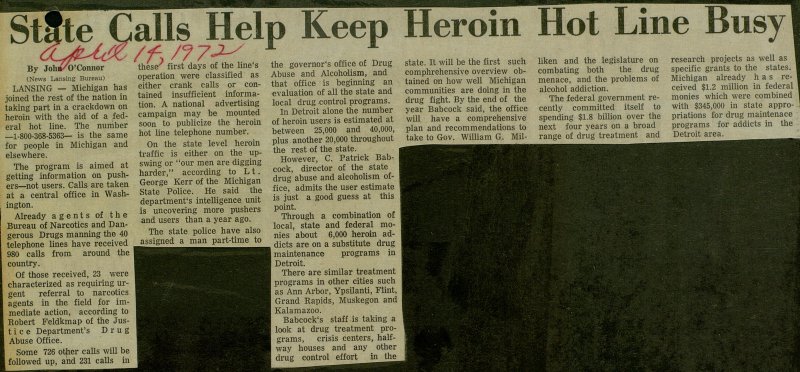State Calls Help Keep Heroin Hot Line Busy

LANSING - Michigan has joined the rest of the nation in taking part in a crackdown on heroin with the aid of a federal hot line. The number -1-800-368-5363- is the same for people in Michigan and elsewhere. The program is aimed at getting information on pushers- not users. Calis are taken at a central office in Washington. Already agents of the Bureau of Narcotics and Dangerous Drugs manning the 40 telephone lines have received 980 calis from around the country. Of those received, 23 were characterized as requiring urgent referral to narcotics agents in the field for immediate action, according to Robert Feldkmap of the Just i c e Department's Drug Abuse Office. Some 726 other calis will be followed up, and 231 calis in these' first days of the line's operation were classified as either crank calis or contained insufficient information. A national advertising campaign may be mounted soon to publicize the heroin hot line telephone number. On the state level heroin traffic is either on the upswing or "our men are digging harder," according to L t . George Kerr of the Michigan State Pólice. He said the department's intelligence unit is uncovering more pushers and users than a year ago. The state pólice have also assigned a man part-time to the governor's office of Drug Abuse and Alcoholism, and that office is beginning an evaluation of all the state and local drug control programs. In Detroit alone the number of heroin users is estimated at between 25,000 and 40,000, plus another 20,000 throughout the rest of the state. However, C. Patrick Babcock, director of the state drug abuse and alcoholism office, admits the user estímate is just a good guess at this point. Through a combination of local, state and federal monies about 6,000 heroin addicts are on a substitute drug maintenance programs in Detroit. There are similar treatment programs in other cities such as Ann Arbor, Ypsilanti, Flint, Grand Rapids, Muskegon and Kalamazoo. Babcock's staff is taking a look at drug treatment programs, crisis centers, halfway houses and any other drug control effort in the state. It will be the first such comphrehensive overview obtained on how well Michigan communities are doing in the drug fight. By the end of the year Babcock said, the office will have a comprehensive plan and recommendations to take to Gov. William G. liken and the legislature on combating both the drug menace, and the problems of alcohol addiction. The federal government recently committed itself to spending $1.8 billion over the next four years on a broad range of drug treatment and research projects as well as specific grants to the states. Michigan already has received $1.2 million in federal monies which were combined with $345,000 in state appropriations for drug maintenace programs for addicts in the Detroit área.